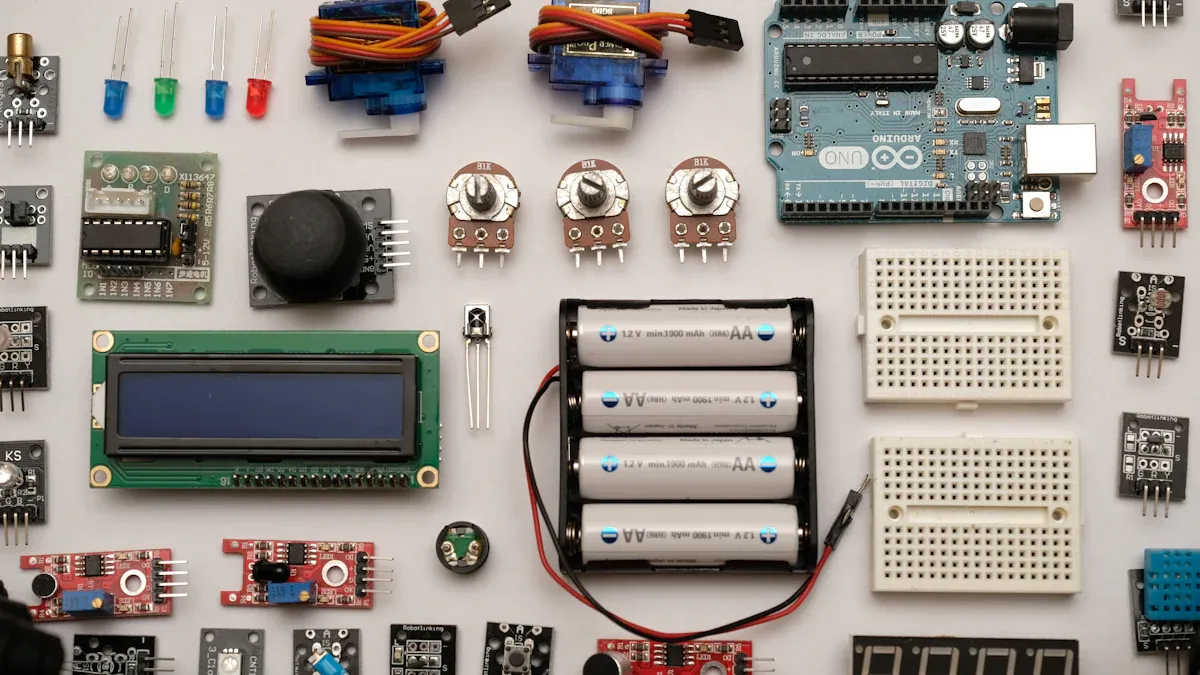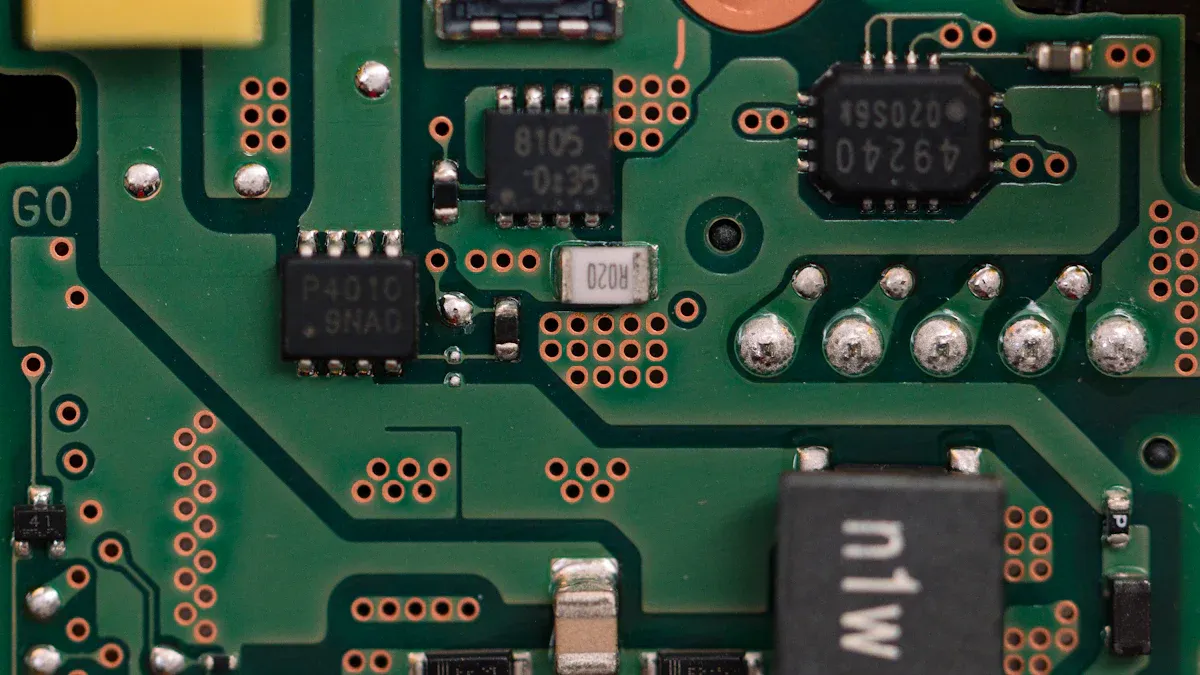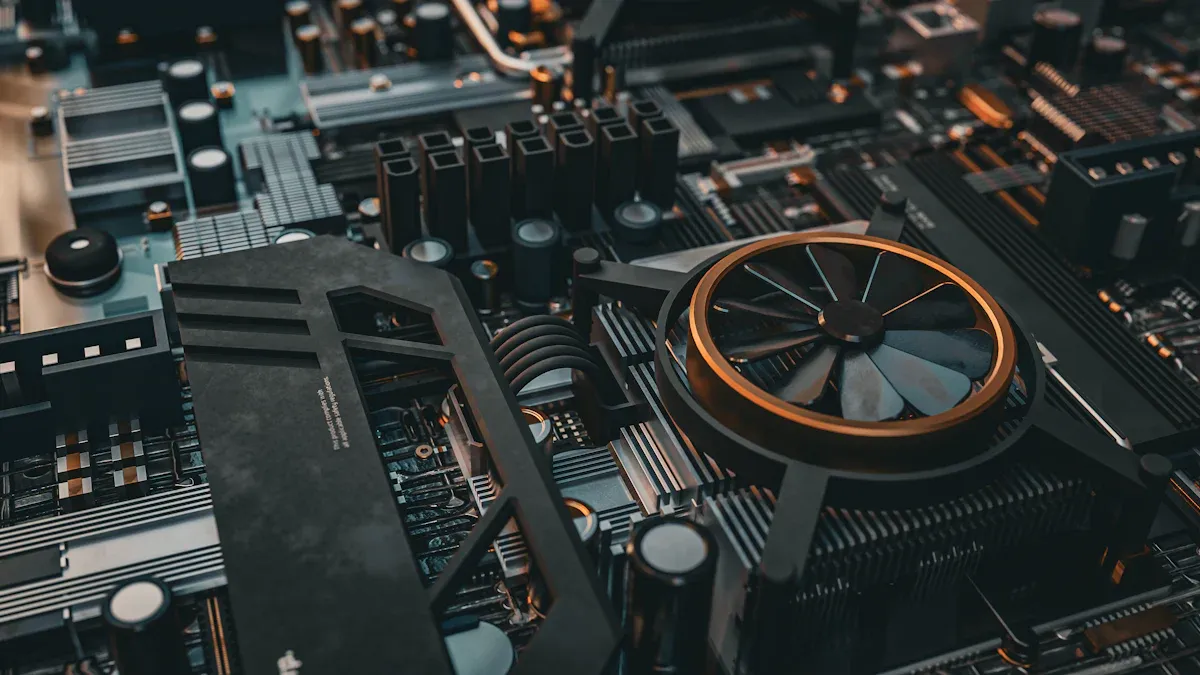Exploring the Features of the MAX2837ETM+ Transceiver

Transceivers like the MAX2837ETM+ play a vital role in today's technology landscape. They support high-speed data transmission essential for various applications. You can see their impact in areas such as 5G networks and data centers. The demand for efficient communication continues to grow, driving innovation in transceiver technology.
Key Takeaways
The MAX2837ETM+ operates in a frequency range of 2.3GHz to 2.7GHz, making it suitable for 5G networks, WLAN, and IoT devices.
This transceiver is energy-efficient, with low power consumption that helps extend battery life in portable devices.
Integrated features like the RF synthesizer and filters enhance performance, ensuring reliable data transmission with minimal noise.
MAX2837ETM+ Specifications

The MAX2837ETM+ transceiver boasts impressive specifications that make it suitable for various applications. Understanding these specifications helps you appreciate its capabilities in modern communication systems.
Frequency Range
The MAX2837ETM+ operates within a frequency range of 2.3GHz to 2.7GHz. This range allows for efficient communication in many wireless applications. You can utilize this transceiver in systems that require reliable data transmission, such as:
5G networks
Wireless local area networks (WLAN)
Internet of Things (IoT) devices
Power Consumption
Power efficiency is crucial, especially in portable devices. The MAX2837ETM+ offers low power consumption, which extends battery life. Here’s a breakdown of its supply current in different operation modes:
Operation Mode | Supply Current (mA) |
|---|---|
Transmitting | |
Receiving | 91 |
This efficient power usage means you can rely on the MAX2837ETM+ for long-lasting performance in battery-operated devices.
Performance Metrics
The performance metrics of the MAX2837ETM+ highlight its effectiveness in data transmission. Here are some key metrics:
Metric | Value |
|---|---|
Rx Noise Figure | |
Data Rate | Supports up to 2048 FFT OFDM |
RF Channel Bandwidth | 1.75 MHz to 28 MHz |
These metrics indicate that the MAX2837ETM+ can handle high data rates while maintaining low noise levels. This capability is essential for applications that demand high-quality signal transmission.
On-Chip Features of MAX2837ETM+

The MAX2837ETM+ transceiver integrates several key components that enhance its performance and efficiency. These on-chip features include a Voltage-Controlled Oscillator (VCO), a crystal oscillator, integrated filters, and an RF synthesizer. Each of these elements plays a crucial role in ensuring reliable communication in various applications.
VCO and Crystal Oscillator
The integrated VCO and crystal oscillator are vital for the MAX2837ETM+'s functionality. They work together to generate precise frequencies necessary for effective data transmission. Here’s a closer look at their specifications:
Feature | Specification |
|---|---|
Package | |
Frequency Range | 2.3GHz to 2.7GHz |
VCO Integration | Yes |
Crystal Oscillator | Integrated, allows for low-cost crystal usage |
Frequency Steps | Smaller than 20Hz |
RF Transceiver Design | Direct-conversion zero-IF |
The integration of these components allows you to use cost-effective crystals instead of more expensive temperature-compensated oscillators (TCXOs). This design choice enhances the overall performance of the MAX2837ETM+ by providing a fast-settling RF synthesizer with minimal frequency steps. As a result, you can expect efficient operation across various wireless broadband systems.
Integrated Filters
Integrated filters are another essential feature of the MAX2837ETM+. These filters help eliminate unwanted signals and noise, ensuring that only the desired frequencies pass through. By incorporating filters directly onto the chip, the MAX2837ETM+ reduces the need for external components. This integration leads to a more compact design and improved signal integrity.
RF Synthesizer
The RF synthesizer in the MAX2837ETM+ significantly enhances frequency agility and stability. Here are some key benefits of this feature:
The MAX2837ETM+ features a fast-settling sigma-delta RF synthesizer.
It allows for frequency steps smaller than 20Hz, enhancing frequency agility.
This design enables precise frequency tuning and rapid adjustments, contributing to stability in wireless applications.
By integrating the RF synthesizer on the same chip, the MAX2837ETM+ achieves improved performance. The close proximity of components enhances signal integrity and reduces latency. Additionally, this design leads to lower power consumption, making the device more efficient overall.
The MAX2837ETM+ transceiver stands out with its impressive features. You benefit from its wide frequency range, low power consumption, and high linearity. Here’s a summary of its key attributes:
Feature | Description |
|---|---|
Frequency Range | 2.3GHz to 2.7GHz |
Integration | Integrates RF-to-baseband and baseband-to-RF paths, VCO, frequency synthesizer, and crystal oscillator. |
Linearity | High linearity |
Noise Performance | Low noise operation |
Power Consumption | Low power consumption |
Package | Compact 48-Pin TQFN package |
Additional Features | On-chip DC offset cancellation, I/Q error, and carrier-leakage detection circuits. |
Synthesizer | Fast-settling sigma-delta RF synthesizer with <20Hz frequency steps. |
Crystal Usage | Allows for low-cost crystal instead of TCXO. |
Application | Suitable for advanced communication systems and efficient data transfer. |
This transceiver is ideal for modern communication systems, ensuring efficient data transfer and reliable performance.
FAQ
What applications can I use the MAX2837ETM+ for?
You can use the MAX2837ETM+ in 5G networks, WLAN, and IoT devices for efficient data transmission.
How does the MAX2837ETM+ achieve low power consumption?
The MAX2837ETM+ integrates several components, optimizing performance while minimizing power usage, which extends battery life in portable devices.
What is the significance of the RF synthesizer in the MAX2837ETM+?
The RF synthesizer enhances frequency agility and stability, allowing for precise frequency tuning and rapid adjustments in wireless applications.
See Also
A Comprehensive Guide to Understanding Communication Chips
Exploring the Functionality of Logic IC Bus Transceivers
Current-Loop Transmitter Chips: Functionality and Applications
Fast Ethernet Transceiver ICs: Overview and Working Principles
